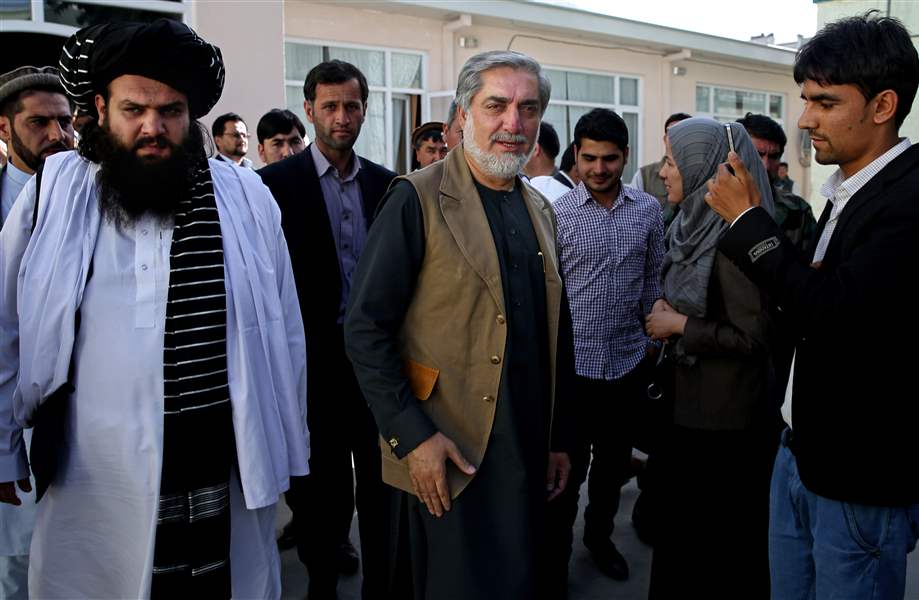
Afghanistan's chief electoral officer resigns
Move a bid to resolve crisis over fraud allegations
6/23/2014
Afghanistan's presidential candidate Abdullah Abdullah, center, leaves after a news conference in Kabul, Afghanistan, Monday, June 23, 2014. Afghanistan's chief electoral officer resigned Monday in a bid to resolve a political crisis over allegations of massive fraud in the runoff presidential vote earlier this month. (AP Photo/Massoud Hossaini)
ASSOCIATED PRESS
KABUL, Afghanistan — Afghanistan’s chief electoral officer resigned today in a bid to resolve a political crisis over allegations of massive fraud in the runoff presidential vote earlier this month.
Zia ul-Haq Amarkhail told reporters that he denies any involvement in fraud but he is stepping down “for the national interest.”
The standoff has threatened what Western officials had hoped would be a peaceful transfer of authority to show progress as U.S. and allied forces wind down their combat mission. The international community has scrambled to find a way out of the impasse, with the U.N. saying it stands ready to assist.
Whoever wins will lead the country as it faces a major transition from rule by President Hamid Karzai, the only leader it has known since the 2001 U.S.-led invasion that ousted the Taliban. He also will face a strong challenge to end violence and improve the economy as he faces a resilient Taliban insurgency and declining foreign aid. Both candidates have promised to sign a security pact with the Obama administration that would allow nearly 10,000 American forces to remain in the country in a training capacity and to conduct counterterrorism operations. A disruption in the announcement of election results could mean another delay in finalizing that agreement.
One of the two candidates, Abdullah Abdullah has said his campaign monitors had recorded ballot box stuffing and other irregularities. He suspended cooperation with the vote counting process and demanded Amarkhail be suspended, claiming the electoral official helped engineer the vote-rigging.
Abdullah received news of Amarkhail’s resignation as he was holding a news conference.
“The door is now open for us to talk to the commission and talk about the conditions and circumstances that will help the process,” he said. “We do believe in transparency of the process and we will defend the legitimacy of the process.”
Amarkhail defended the conduct of the June 14 balloting and called on Abdullah to resume relations with the Independent Election Commission and honor an agreement he had signed to respect its decisions.
“I want to say that there has not been any pressure on me to resign,” he said at a news conference. “The only reason for my resignation is the national interest of my country so now Dr. Abdullah should end his boycott and ... and should respect the code of conduct that he had signed with the commission on the first day.”
Abdullah is running against Ashraf Ghani Ahmadzai in the race to replace Karzai, who is constitutionally barred from seeking a third term. The standoff has upended the process after the Afghans received praise for a relatively smooth first round of voting on April 5, when millions of voters defied a Taliban threat of violence and cast their ballots.
Abdullah and Karzai have proposed that the U.N. step in to mediate between the parties, and the U.N. mission in Afghanistan has said it stands ready to assist.
As a result of complaints by both candidates, electoral officials are auditing 10 percent of the ballots cast in five provinces — Khost, Paktia, Paktika, Ghor and Nuristan — where fraud allegations were heaviest, Independent Election Commission chairman Ahmad Yousuf Nouristani said. He said national and international observers will be present. Officials would use that to determine how much of the vote in each province was expected, he said.
It was unclear what would happen if major fraud is confirmed, although Abdullah has called for new elections in the contested areas. The election law calls for the contested ballots to be thrown out.
Western officials have long said they anticipated irregularities and the determining factor would be whether the vote rigging was sufficient to affect the overall outcome. The 2009 re-election of Karzai was marred by widespread ballot box stuffing and proxy voting, leading Abdullah, who was runner-up at the time, to refuse to participate in the runoff.
Abdullah, a former foreign minister, won the first round but failed to gain the majority needed to avoid a runoff. He raised his allegations before any results were released, saying he had to act pre-emptively because reports by some 50,000 campaign monitors deployed at the polls showed Ahmadzai coming from behind with an unrealistic lead.
Ahmadzai, a former finance minister and an ex-World Bank official, issued no direct public comment, but his spokesmen have called for patience and to wait for final results.
According to the election commission’s official timetable, preliminary results are due on July 2, then final results on July 23. Karzai has set Aug. 2 as the date for the new president to be inaugurated.
Amid the chaos, violence has continued to plague the country.
Today, the Taliban released 33 professors and students abducted nearly two weeks ago in the eastern province of Ghazni, deputy provincial governor Mohammad Ali Ahmadi said the hostages were freed after mediation by tribal elders in the region and staff from the office of the International Committee of the Red Cross in Ghazni.
The 33, most of whom are professors at the Kandahar University, were on their way to the Afghan capital, Kabul, when their bus was stopped by the Taliban in Ghazni’s Qarabagh district.
Taliban spokesman, Zabihullah Mujahid, confirmed the release of the 33 in a statement to media. He didn’t say if a ransom was involved or provide details.